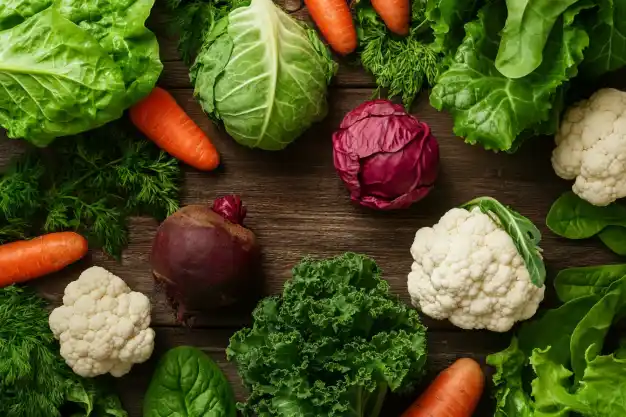Winter gardening is a rewarding way to enjoy fresh produce throughout the colder months. With the right vegetables, tools, and techniques, you can turn your garden into a thriving winter haven. This Winter Vegetable Growing Guide highlights the best crops for the season and provides tips for planting, caring, and harvesting them successfully.
Why Grow Vegetables in Winter?
Growing vegetables in winter offers numerous benefits:
- Fresh Produce Year-Round: Enjoy nutrient-rich vegetables when store-bought options are often limited or expensive.
- Extended Growing Season: Winter gardening keeps your soil active and productive during the off-season.
- Sustainability: By growing your own vegetables, you reduce your reliance on store-bought produce and lower your carbon footprint.
For more winter gardening tips, visit Kamala’s Garden.
Understanding Winter Gardening
Key Factors for Winter Gardening
- Climate: Choose vegetables suited to your growing zone. Hardy varieties thrive in frost-prone areas.
- Soil: Ensure well-draining, fertile soil to prevent waterlogging.
- Sunlight: Winter crops need at least 4–6 hours of sunlight daily.
Preparing Your Garden
- Remove summer crop residues and weeds.
- Add compost or organic matter to enrich the soil.
- Use mulch to insulate the soil and protect plant roots.
When to Plant Winter Vegetables
Optimal Planting Time
- Plant hardy vegetables in late summer to early autumn for a winter harvest.
- For areas with severe frost, start seeds indoors or under cloches.
Choosing the Right Varieties
Winter-hardy vegetables like kale, carrots, and spinach are ideal for thriving in cooler temperatures.
The 8 Best Vegetables to Grow in Winter
1. Kale
Kale is a superfood that becomes sweeter with frost exposure.
- Care Tips: Plant in well-draining soil with full to partial sunlight.
- Harvesting: Pick outer leaves as needed, allowing the plant to continue growing.

2. Carrots
Cool temperatures enhance the natural sweetness of carrots.
- Soil Requirements: Loose, sandy soil is ideal for root development.
- Harvesting: Leave carrots in the ground until needed to keep them fresh.

3. Spinach
Spinach is a hardy crop that provides a continuous harvest of nutritious leaves.
- Ideal Conditions: Grow in partial sun with consistently moist soil.
- Harvesting: Pick the outer leaves first to encourage new growth.

4. Lettuce
Cold-resistant varieties of lettuce thrive in winter.
- Tips: Use row covers or cloches to protect against frost.
- Container Gardening: Lettuce grows well in pots, making it ideal for small spaces.

5. Asian Greens
Bok choy, mizuna, and tatsoi are quick-growing greens perfect for winter.
- Care Tips: Keep soil moist but not waterlogged.
- Harvesting: Cut leaves individually or harvest entire heads as needed.

6. Scallions (Green Onions)
Scallions are easy to grow and can be harvested multiple times.
- Care Tips: Plant in well-draining soil and water sparingly in colder months.
- Harvesting: Cut the greens above the base to allow regrowth.

7. Beets
Beets are a dual-purpose crop, offering both greens and roots.
- Cold Tolerance: Beets can withstand light frost, which improves their flavor.
- Harvesting: Pull roots when they’re 2–3 inches in diameter for the best taste.

8. Turnips
Turnips are versatile winter crops that provide nutritious greens and flavorful roots.
- Planting Tips: Space seeds evenly to prevent overcrowding.
- Harvesting: Pick greens early and allow roots to mature for later use.
For additional suggestions, explore Savvy Gardening’s winter vegetable guide.

How to Care for Winter Vegetables
Protecting Crops from Frost
- Use row covers, cloches, or cold frames to shield plants from extreme temperatures.
- Apply a layer of mulch around plants to insulate the soil.
Watering During Winter
- Water less frequently but deeply to keep the soil moist without over-saturating.
- Avoid watering in the evening to reduce the risk of freezing.
Fertilizing Winter Crops
- Apply slow-release or organic fertilizers to maintain steady nutrient levels.
- Avoid over-fertilizing, which can stress plants in colder weather.
Common Winter Gardening Challenges
Pests and Diseases in Cold Weather
- Common pests include aphids and slugs. Use natural deterrents like neem oil or diatomaceous earth.
- Manage fungal diseases by ensuring proper spacing and air circulation.
Soil Management in Winter
- Rotate crops to prevent nutrient depletion.
- Cover bare soil with mulch or cover crops to protect its structure and fertility.
Harvesting and Storing Winter Vegetables
When to Harvest
- Harvest greens like kale and spinach continuously throughout the season.
- Root vegetables like carrots and beets can stay in the ground until needed.
Storage Tips
- Store root vegetables in a cool, dark place with high humidity.
- Wrap leafy greens in a damp cloth and refrigerate to maintain freshness.
Additional Tips for Winter Gardening
Using Cold Frames and Greenhouses
- Cold frames and greenhouses extend the growing season by protecting plants from harsh weather.
- They also help maintain consistent temperatures and humidity.
Succession Planting for Continuous Harvests
- Stagger plantings every 2–3 weeks to ensure a steady supply of vegetables.
- Replace harvested crops with quick-growing greens for ongoing yields.
FAQs
- What Are the Easiest Vegetables to Grow in Winter?
Kale, spinach, and lettuce are beginner-friendly winter crops that require minimal care, making them excellent choices in any Winter Vegetable Growing Guide. - Can I Grow Winter Vegetables Indoors?
Yes, many vegetables like lettuce, scallions, and spinach thrive in containers with adequate light, as highlighted in this Winter Vegetable Growing . - How Do I Protect Plants from Extreme Frost?
Use frost blankets, row covers, or mulch to shield plants from freezing temperatures, a key tip from this Winter Vegetable Growing.
Conclusion
Start Growing Winter Vegetables Today
Winter gardening is a fulfilling way to extend your growing season and enjoy fresh produce year-round. With this Winter Vegetable Growing Guide, you’ll have the tools and knowledge to cultivate cold-hardy vegetables like kale, carrots, and spinach. Start planting today and reap the rewards of a productive winter garden!
For more tips, visit Kamala’s Garden or explore Savvy Gardening’s winter vegetable ideas.

